|
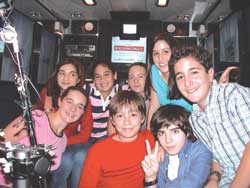
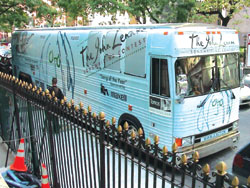
Education
Update Sponsors the John Lennon ‘Million Dollar Bus’
by Marie
Holmes
Holland,
an 8th grade student at the Professional Performing Arts School,
announces that she has been working on a song. Without so much
as a blush, she belts out the chorus, hitting every note. The
five other students applaud. Yes, this is going to be their
song. Within ten minutes, they’ve composed the lyrics
for the first verse.
“Now
we need a bridge,” announces Holland. That accomplished,
someone suggests a second verse, and perhaps a “tag”
at the end.
“They
know what they’re doing,” laughs Herminio Quiroz,
a sound technician on the John Lennon Educational Tour Bus.
These students do have an edge in the music world. At the Professional
Performing Arts School in midtown, the day is divided between
academic and performance courses. Some of their peers work on
Broadway and in film and television, and the kids frequently
talk about and sing the hit song written by Alicia Keys, one
of the school’s best known graduates. 
The bus has hosted students from kindergarten through high school,
aspiring musicians and those who had never played an instrument,
touring the country for ten months out of the year. Described
as a “non-profit recording studio,” the bus project
is an offshoot of the annual John Lennon Songwriting Contest.
Eight years ago, in a meeting with Yoko Ono, Brian Rothschild
of Das Ventures mentioned the idea of holding a songwriting
contest. Ono was interested in developing the project, and with
her help, the first contest was launched in 1997.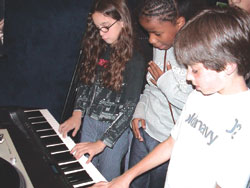
“I
had the thought to take a bus and outfit it with recording capabilities,”
says Rothschild, “and right away I was sending it to schools.”
Maxell, Yamaha, Guitar Center and other companies donated sound
engineering equipment and instruments, and by 2000 the bus had
become its own non-profit organization. The front section houses
top of the line electronic equipment, allowing students to mix
beats and sounds, while the back half, behind the tiny bunks
carved out for the traveling sound engineers, holds guitars,
bass and keyboard and equipment for students to record their
own songs.
“The
bus alone is worth $400,000,” says Jeff Sobel, another
sound engineer, who adds that they sometimes call it the ‘million
dollar bus’, though the total value of the donated equipment
could easily exceed that.
Groups of young people, like the students at Professional Performing
Arts, are invited to spend a number of hours on the bus, during
which they write, record and even produce videos of their original
songs. When following concert tours, such as WARPED and Sprite
Liquid Mix, the students from Boys and Girls Clubs and other
groups spend the day on board to record a song and perhaps meet
some of the touring musicians, who often stop by, occasionally
taping their own work.
The students at Professional Performing Arts that evening only
had four hours in which to record their song. Within an hour
they had finished the lyrics and were singing along as Quiroz,
on the keyboard, and Sobel, on guitar, composed the accompaniment.
The four girls took on the first verse, embellishing the lyrics
with riffs. It took a bit longer to arrange the second verse,
complicated by the pre and post-pubescent vocal ranges of the
boys. When harmony and melody finally meshed, the girls offered
praise and encouragement: “That sounds so nice!”
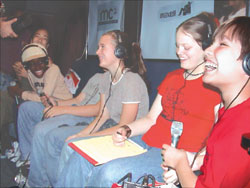
They decide to expand the bridge so that each student will sing
his or her own line, then practice the whole thing as Quiroz
and Sobel record the instrumentals. When the last notes of their
first run-through die off, Holland exclaims breathily, “That
gave me chills that was so good!”
“I
can’t believe we wrote a song!” says Danielle, wondering
if they can earn extra credit at school.
After sitting and singing for three hours, they’re finally
having trouble sitting still. “This is tiring,”
admits Holland
But when Quiroz and Sobel hand out headphones, they get serious
again. Disappointed with the first take, they’re ready
to stay all night in order to get it right, but parents are
already waiting and calling cell phones. On the third take,
nobody misses a cue. A few of the girls tape extra riffs to
add onto the last chorus, and within half an hour the recording
is mixed, burned onto CDs and handed out to the young songwriters.
“I’m
gonna go home and play it over and over again,” says one.#
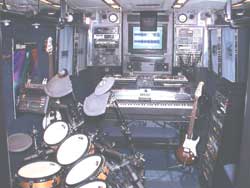

Education
Update, Inc., P.O. Box 20005, New York, NY 10001.
Tel: (212) 481-5519. Fax: (212) 481-3919.Email: ednews1@aol.com.
All material is copyrighted and may not be printed without express
consent of the publisher. © 2002.
|
